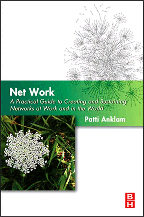All networks are not the same
SOCNET has a very interesting conversation going, stimulated by Valdis Krebs’ posting of a link to a Science article, Sizing up complex webs. The article suggests that all networks, from a very far distance, look the same. Valdis notes that many of the organizational networks he has studied don’t look like this at all. Others concur, chiming in that networks with humans in them can’t be that consistent. Then, Balazs Vedres of Columbia says:
If something is the same, ie. constant, invariable, can it be of interest to social scientists? I would think you need variability in order to explain anything. Maybe this is the contrast between social scientists and physics people interested in networks.
Ajay Mehra of U. of Cinncinati requests that social scientists cut the physicists some slack:
One reason that physicists like Barabasi are so excited about the “new”
science of networks is that it holds out the promise for general laws of networks that would apply across all kinds of networks. Those studying organizational networks have argued for some time that this quest for general laws may be misguided. Still, I for one say let’s not dampen the physicists enthusiasm just yet. Even if their quest for universal laws of networks proves unattainable, they are sure to throw up marvelous insights along the way.
Bettina Hoser from the University of Karlsruhe and others argue for more collaboration among the physicists and sociologists, and Leon Danner, University of Barcelona, offers a possible explanation:
…the physics approach to networks centers on the global properties and large scale organisation, while the social science approach is more individual based. Therefore physicists tend to study datasets with large numbers of nodes, while sociologists are content studying smaller networks. The other reason is educational. As a physicist, I find it much more demanding to read a sociology paper than I do reading a physics paper and I’m sure it’s the case the other way around. I also think that the some really interesting research is/will be right at the interface between the two approaches.
Yes, say others (and myself). It’s the confluence of disciplines, the back and forth, things meeting on the edge where the insights and excitement occur.





1jheuristic
wrote on 13 March 2005 at 12:51
Hi -
The issue here is our conditioning for prescriptive technique. It is infuriating. Frankly, using tools and methods to drive descriptive conversations on network structures is infinitely more productive for business. It probably won’t earn anybody a Ph.D., but it sure will help retire obsolete management modalities that choke and confine the effectiveness of modern firms and the experience of stakeholders.
-jheuristic
http://kmblogs.com/